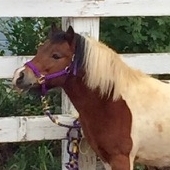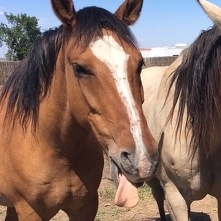
“There’s something about the outside of a horse that’s good for the inside of a man.”
Winston Churchill
Gender sensitive language aside, Churchill was on to something. I’ve met a lot of people who have had powerful experiences with horses and come away thinking horses are “magical.” I’m very happy those people have had such positive experiences, and the truth is there are actually very real, scientific reasons based on millions of years of evolution why working with horses feels so magical. Horses have several characteristics that make them wonderful teachers of self-regulation and self-awareness, healthy relationship building, and confident social skill development. Here are my top four favorite facts about horses and how working with them benefits humans:
Their primary concern is survival
Because they’re prey animals and humans are predators, horses size you up quickly to determine if you’re a threat. Their only immediate concern is their survival; they don’t want to be dinner. In order to interact successfully with them, you have to become aware of how you feel and what you’re projecting. Then, you have to learn to manage your energy and behavior in a way that convinces the horse that you are not about to eat them. This requires you to use non-aggressive leadership skills, even in difficult situations.
They sense and react to your energy
Next is something called “emotional contagion.” Horses depend on being part of a herd in order to survive because that gives them more ears and eyes to be on alert for danger. When they sense danger, they have to be able to communicate that with each other over long distances. So, they’ve evolved to be able to sense and adopt the emotional state of other members of the herd. That way, if one member feels threatened, all members will almost instantly feel threatened too, and when one member feels relaxed, all members will relax. Emotions, it turns out, are contagious. When you work with horses, you join their herd and the horses will adopt your emotional state. It can work the other way too. When the horses are relaxed, their calmness can calm you. Understanding the concept of emotional contagion helps with recognizing, regulating and managing emotions both personally and in relation to others.
They change their behavior as soon as you change yours
Horses don’t judge others like humans do, and they also don’t act nice just to be polite. Everyone loves when I say that. Horses react purely to the energy in front of them in the moment; which they reassess every instant. Remember, they’re prey animals. In the wild, they can’t afford to assume that the tree they were standing under just a moment ago is still safe to come back to. They have to make sure a mountain lion hasn’t climbed up to wait for breakfast.
You could say that horses are masters at living in the moment, basing their behavior on precisely what’s happening right now, not what happened five minutes ago or what they hope will happen later today. This means that any “mistakes” you make when working with a horse will be “forgiven” as the horse reassesses you in the very next instant. You have innumerable second chances. How rare is that in the human world? However, that also means you can’t rest on your laurels when working with horses. Just because you were effective five minutes ago doesn’t mean you can get lazy and not try just as hard right now. This helps people learn to live in the moment, focus on the present, try new things, decide what works and does not work, and feel completely accepted, mistakes and all! How great is that? Because horses don’t do things to be nice or to be mean, everything that happens when working with a horse is earned. Imagine the satisfaction and sense of empowerment that come from seeing a 1,200 pound animal do exactly what you’ve asked him or her to do.
They’re masters of nonverbal communication
Finally, horses don’t have the luxury of figuring out any hidden messages in communication. They “say what they mean and mean what they say” within the herd and when working with humans. Better yet, they expect and require the same from the humans in their herd. Learning to listen and communicate clearly, to depersonalize communication, and to manage conflict empowers people in relationships.




